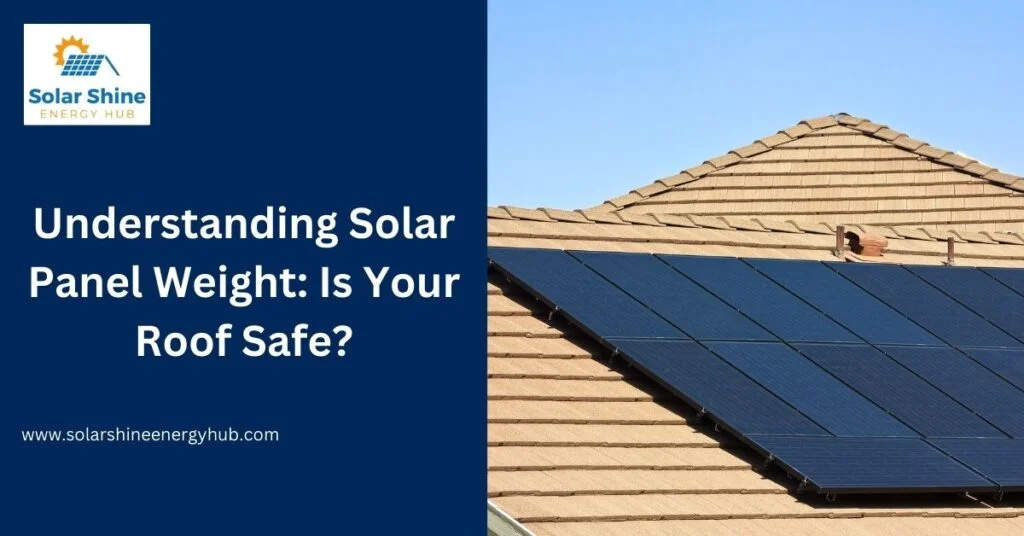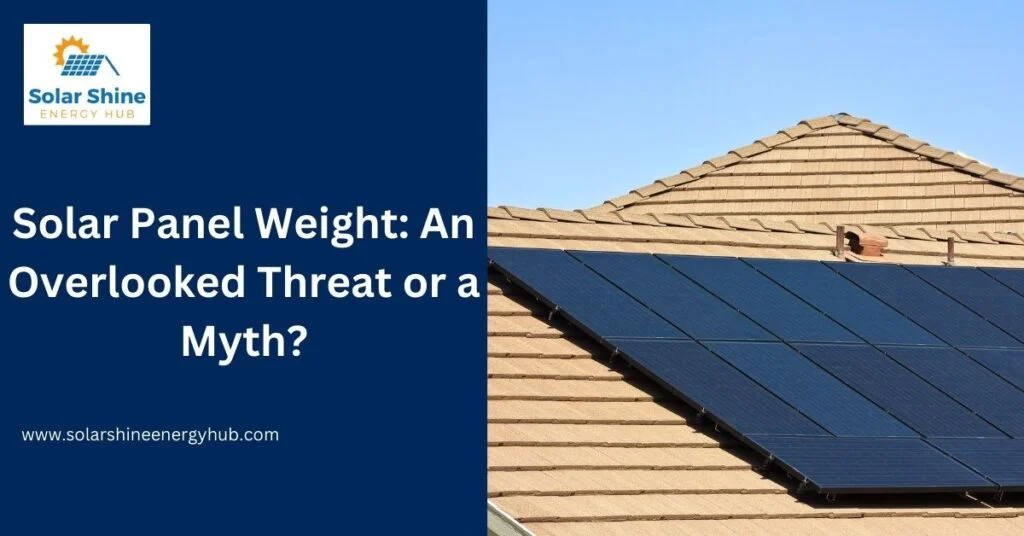Are solar panels heavy for roofs? The prospect of harnessing the sun’s power through solar panels is an enticing one, but does the weight of these eco-friendly devices pose a threat to the structural integrity of our roofs? Are we inadvertently trading one challenge for another?
Solar panels, on average, add only about 3-4 pounds per square foot, which is typically within the acceptable load limit of a roof. Thus, they are generally not too heavy for roofs. However, the integrity of individual roofs can vary, so a professional assessment is recommended.
The following blog post aims to shed light on this concern, providing a comprehensive understanding of the weight of solar panels and the implications for your roof. We’ll delve into the nuts and bolts of solar panel installations and their impact on various roofing structures.
Understanding Solar Panel Weight: Is Your Roof Safe?

Solar panel weight can be a concern for homeowners. The average residential solar panel weighs around 40 pounds, with dimensions of about 65 inches by 39 inches. It’s crucial to understand how this weight impacts your roof, especially if you’re considering a large solar array.
Materials and Weight
Solar panels are composed of several layers, each contributing to the overall weight. The most substantial parts are the glass surface and the metal frame. Despite this, the weight is evenly distributed over a large area, reducing the stress on any one point of the roof.
Load Bearing of the Roof
Every roof has a certain load-bearing capacity which should not be exceeded. It’s crucial to have a professional check whether your roof can bear the additional weight of solar panels. If not, you may need structural reinforcements before installation.
Weight Distribution
The weight of solar panels is not concentrated in one area but spread across the entire structure, which lessens the impact. However, the mounting system also contributes to the total weight and must be properly installed to ensure safe and even weight distribution.
Solar Panels: A Threat to Roofing Structures?
Contrary to common perceptions, solar panels do not inherently pose a threat to roofing structures. However, specific circumstances, including improper installation or pre-existing roofing issues, could lead to potential problems.
Improper Installation
Incorrect installation of solar panels can lead to roof damage. It’s essential to hire professional installers with a solid track record to avoid issues like leaks, which could compromise the roof’s overall integrity.
Pre-Existing Roofing Issues
Installing solar panels on a roof with existing damage or wear and tear could exacerbate these issues. Evaluating the roof’s condition before installation helps prevent potential damage.
Weather Conditions
While solar panels are designed to withstand harsh weather conditions, extreme weather may pose risks. Regular maintenance and inspection can aid in identifying potential issues early and mitigate any damage.
Solar Panel Installations: Assessing the Roof Load Impact

The process of assessing roof load impact before installing solar panels is essential to ensure safety and durability. This involves considering various factors, from your roof’s design and material to the anticipated weight of the installed solar system.
Roof Design and Material
- Roof design significantly impacts weight tolerance.
- Different roofing materials can bear varying weights.
- Steep roofs may require special installation techniques.
- Flat roofs might accumulate snow, increasing weight.
- Ensure the material isn’t prone to damage.
Anticipated Solar System Weight
- Consider the total weight of the panels.
- Mounting equipment adds to the overall weight.
- Wiring elements shouldn’t be overlooked.
- Factor in additional accessories if any.
- Review the total weight against roof capacity.
Professional Assessment and Reinforcement
- Hire professionals for accurate weight assessment.
- Reinforcements might be needed for safety.
- Professional installers can suggest best practices.
- Regular inspection ensures sustained weight balance.
- Remember, safe installation ensures long-term performance.
Does the Weight of Solar Panels Compromise Roofs?
The weight of solar panels generally does not compromise roofs. However, certain factors could influence this, such as the roof’s structural integrity, the installation process, and regular maintenance.
Structural Integrity of the Roof
- A strong roof can typically handle solar panels.
- Pre-installation assessment checks for structural issues.
- Weak spots might need structural reinforcements.
- Overloading a weak roof can cause problems.
- Professional assessment aids in identifying risks.
Installation Process
- Quality installation reduces potential roof damage.
- Proper fixing avoids undue pressure points.
- Skilled installers ensure even weight distribution.
- Incorrect installation can lead to leaks.
- Regular checks post-installation enhance roof safety.
Regular Maintenance
- Regular maintenance identifies potential weight issues.
- Routine checks can spot panel damage.
- Timely repair can prevent further complications.
- Weather damage should be repaired promptly.
- Maintaining panels keeps them lightweight and effective.
Solar Panel Weight: An Overlooked Threat or a Myth?

The notion that solar panel weight poses a significant threat to roofs is largely a myth. While they certainly add some weight, they typically don’t exceed a roof’s load-bearing capacity. However, certain precautions should be taken to minimize any potential risk.
Importance of Quality Materials
High-quality solar panels and mounting equipment can ensure safety and durability. They are designed to withstand weather conditions and last for a significant period. Better materials mean less chance of damage and therefore, less likelihood of added weight or pressure.
Pre-Installation Assessment
Having a professional assess your roof before installation can help identify any potential issues. They can check the roof’s structural integrity and help you understand whether it can handle the additional weight of the solar panels. This step is crucial for preventing future complications.
Routine Maintenance and Inspections
Regular maintenance and inspections are vital for ensuring your solar panels continue to function efficiently without causing any unnecessary strain on your roof. Any damage or wear and tear can be identified and addressed promptly, preventing further issues.
Mitigating Weight Concerns: Precautions while Installing Solar Panels
Solar panel installation should be carried out carefully, considering the weight implications on the roof structure. Proper planning, use of quality materials, and regular maintenance are key steps in this process.
Proper Planning and Assessment
Before proceeding with installation, a thorough evaluation of your roof is essential. This includes checking the roof’s strength, and ability to handle the added weight, and identifying any potential structural issues.
Use of Quality Materials and Professional Installation
High-quality solar panels and mounting equipment reduce the risk of roof damage. Engaging professional installers helps secure a safe and efficient setup, ensuring the even distribution of weight.
Regular Maintenance and Inspections
Regular maintenance and inspections are crucial to detect any damage or wear and tear on time. It helps in maintaining the efficiency of panels and prevents further complications due to overlooked issues.
Conclusion Are solar panels heavy for roofs
In conclusion, while the weight of solar panels may seem like a formidable concern, it is largely a myth when managed effectively. With careful planning, professional installation, and regular maintenance, solar panels can add immense value to your home without compromising the structural integrity of your roof. Embrace the power of the sun, lighten the load on your utility bill, and embark on a journey to a greener, more sustainable future today.